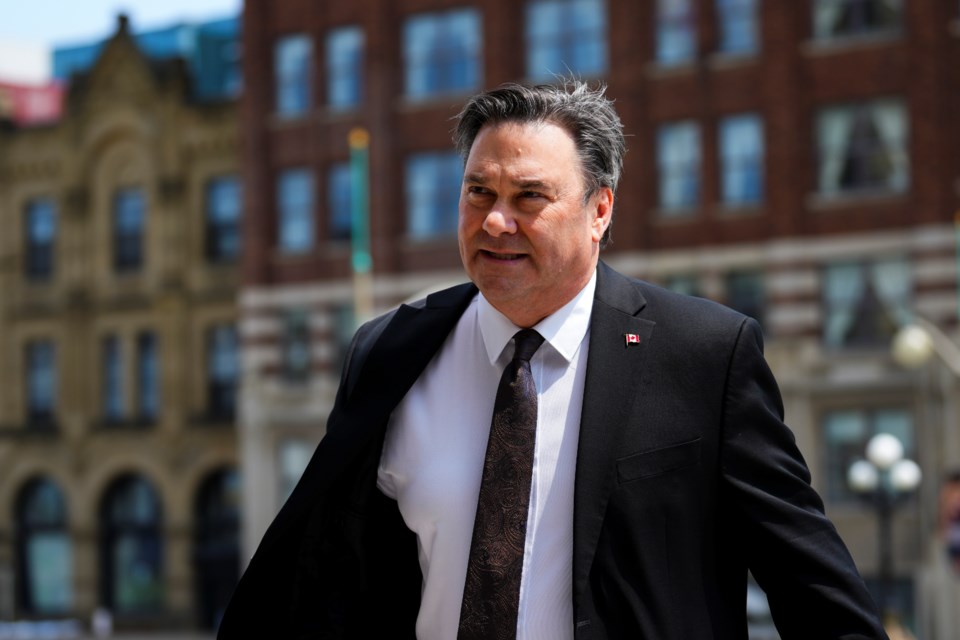NDP interim leader Don Davies is insisting that his squad can re-position itself as a “strong progressive option” in Ottawa, but warns that doing so requires it to have an “honest assessment” of the party’s poor showing in the April election.
Davies made the comments during an appearance on the Paikin Podcast Thursday, which is hosted by veteran journalist Steve Paikin and features a panel of ex-Liberal MP Martha Hall Findlay and former CPC minister Tony Clement.
(In co-operation with Village Media, the parent company of Parliament Today, the Paikin Podcast also runs every Saturday morning on our local news sites.)
The wide-ranging discussion saw the panel discuss fallout from the federal election, in which the NDP was reduced to seven seats in the House and lost recognized party status. Davies didn’t mince words, calling the showing the “worst result in the history of our party.”
“One of the few advantages of being burned to the ground is that we get to recreate our foundation,” Davies said. “So there is an opportunity here.”
Key to seizing that opportunity is the ongoing campaign review being led by former candidate and Ottawa lawyer Emilie Taman, who is expected to wrap her voluntary work with a report due by the end of the year.
Davies spent much of the podcast offering his own reflections on what he described as the party’s poor campaign under ex-leader Jagmeet Singh, who lost his B.C. seat and announced his plans to step down as leader on election night. A leadership race to find his permanent replacement and take over from Davies, who was given the interim job in May, begins on Tuesday and ends at the party’s Winnipeg convention on March 29.
According to the Toronto Star, NDP MP Heather McPherson and failed party candidate Avi Lewis are among those gearing up to launch leadership bids, with their teams reportedly collecting signatures from members at events like the Ottawa Pride parade last weekend.
The podcast panel floated the possibility of Manitoba Premier Wab Kinew leading the federal squad. Kinew, who expressed disappointment in his federal counterpart’s showing after the April vote, has publicly ruled out replacing Singh. Kinew said his plans are to continue in his provincial role and seek re-election “in a few years,” teeing up what is expected to be a 2027 provincial run.
Davies suggested a lot is riding on the federal leadership contest.
“Who the leader is of a party seems to have a disproportionate impact on Canadian politics. We can say it should be the platforms, it should be the policies, but to be frank, in my time observing, it's what the leader is that matters a lot,” Davies said. “(Prime Minister Mark) Carney is a classic example.”
Carney’s rise to replace an unpopular Justin Trudeau was among the external factors Davies listed as impacting his party’s showing, counting the threat of U.S. President Donald Trump as another. He said the NDP bled support to the Liberals to prevent CPC Leader Pierre Poilievre’s ascension to power, but remained hopeful that this dynamic is proof there is a place on the Hill for his party.
“The good news for us is that I don’t think that's a rejection of NDP values or NDP policies or principles, necessarily; it was almost a lending of the vote,” he said.
Down but not out
Clement argued the NDP’s signing of a confidence-and-supply agreement (CASA) with the Liberals in the last Parliament put the party in a tough spot, adding that Singh ripped up the deal in September only to back the Liberals on a non-confidence vote brought forth by Poilievre in December.
Davies said Singh was walking an "impossible tightrope,” but that his move was in a bid to stave off an election during a time when the CPC was leading in the polls. Still, Clement argued this “allowed the Liberals time” to ditch Trudeau and usher in Carney, shifting the political dynamic in Ottawa.
Davies conceded any “strategic” missteps will be a part of Taman’s review and admitted that among the questions his party is still “processing” is how the since-defunct deal constrained the opposition party from criticizing the feds.
“We all know the political truism that the junior partner in any kind of small-c coalition, and I’ll just call it that, tends to suffer because we tend to absorb all of the negativity and dislike of the main government, and we don't really get the credit for the good things,” he said.
“The question of ‘should we have done it and would we do it over again’ is a good one. I’m not sure the signing of the CASA itself was responsible for our demise.”
For Davies, the NDP may be down, but it’s not out in the new Parliament.
While there have been early signs of co-operation between Carney and Poilievre since the election, he argued it’s only a matter of time until that begins to show cracks.
“Although the numbers have changed significantly, the primary makeup of Parliament hasn't changed, the NDP holds a balance of power,” Davies said of the minority Parliament. “I think the Carney government is going to have to turn to the NDP at some point if it wants to survive.”




